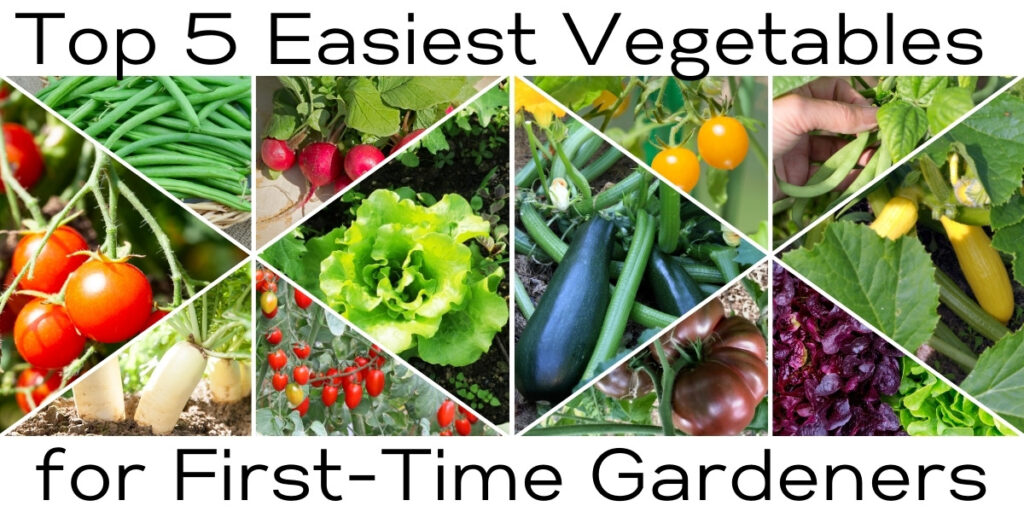Choosing vegetable seeds can be both thrilling and daunting for beginners. You’re likely feeling the excitement of planning your garden and the anticipation of watching your own vegetables grow. But how do you decide which seeds to buy and where to buy them. Seeds are literally the starting point of the garden, so this step is extremely important to get right. This guide will help you navigate the world of seed selection and find the best seeds for your vegetable garden.
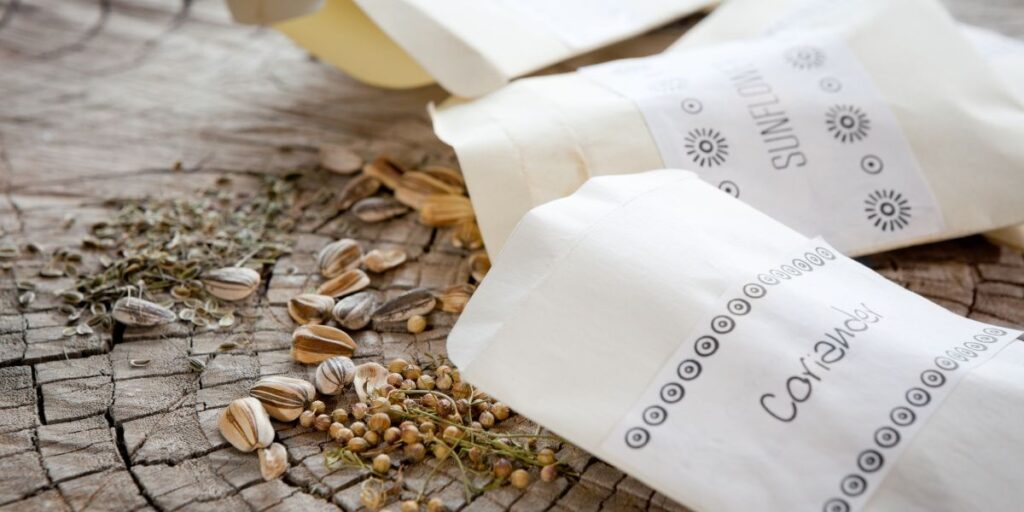
Table of Contents
Seed Types: Heirloom, Hybrid, and Open-Pollinated
When choosing vegetable seeds, it’s important to understand the different types available.
Heirloom Seeds
Heirloom seeds are like treasures passed down through generations. These seeds have been around for at least 50 years, with some dating back to colonial times! You’ll love heirloom seeds for their unique flavors, colors, and shapes that you won’t find in most grocery stores.
One of the best things about heirloom seeds is that you can save them year after year. When you plant heirloom seeds, the plants grow “true to type,” meaning the next generation will have the same characteristics as the parent plant. This makes heirloom seeds perfect if you want to save money and maintain your favorite varieties.
Heirloom vegetables often have fascinating histories. For example, the ‘Arkansas Traveler‘ tomato, which dates back to the pre-1900s, is known for its delicious taste and ability to thrive in hot, humid conditions. These seeds have stood the test of time, adapting to specific regions and climates.
Hybrid Seeds
Hybrid seeds are created when two different varieties of the same plant species are cross-pollinated. These seeds are often labeled as F1, which stands for “first generation.” You’ll find hybrid seeds popular because they combine the best traits of both parent plants, resulting in vegetables that are often more disease-resistant, uniform in size, and higher-yielding.
While hybrid seeds have their advantages, there’s a catch: you can’t save seeds from hybrid plants and expect them to grow true to type the following year. The seeds from hybrid plants often produce unpredictable results, which means you’ll need to buy new seeds each season if you want to grow the same variety.
Open-Pollinated Seeds
Open-pollinated seeds fall between heirloom and hybrid varieties. These seeds are naturally pollinated by wind, insects, or other means. You’ll love that you can save open-pollinated seeds year after year, just like heirloom seeds.
Open-pollinated varieties offer more genetic diversity than hybrids, allowing them to adapt better to local growing conditions over time. This makes them an excellent choice if you want to develop plants suited to your specific climate and soil.
When planning your vegetable garden, it’s crucial to consider which type of seeds best fits your goals. If you want to save seeds and maintain a variety over many seasons, heirloom or open-pollinated seeds are your best bet. If you’re after specific traits like disease resistance or uniformity, hybrid seeds might be the way to go.
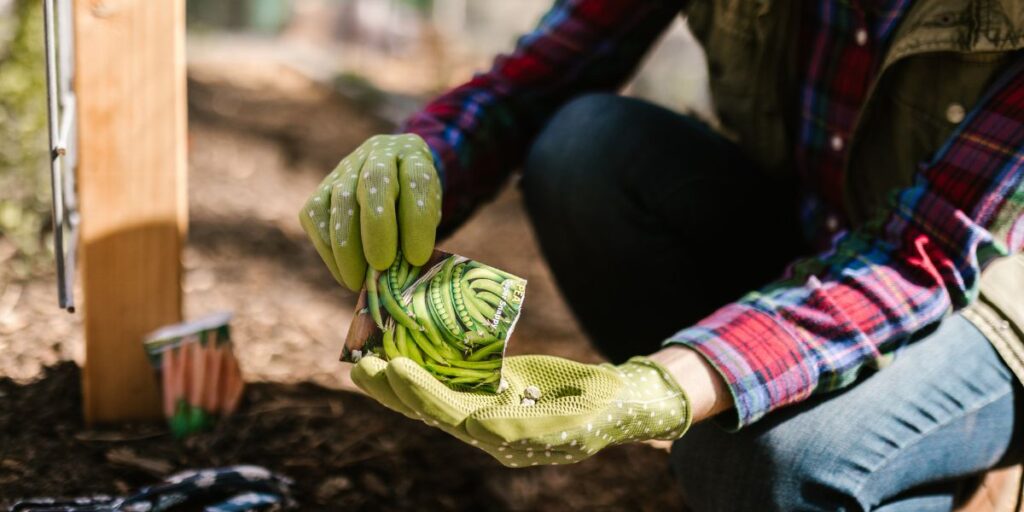
Factors to Consider When Choosing Seeds
When selecting vegetable seeds for your garden, you need to take several important factors into account. By considering these elements, you can ensure successful garden planning and choose the best seeds for your vegetable patch.
Climate and Growing Zone
One of the most crucial aspects to consider when selecting seeds is your climate and growing zone. Different vegetable varieties thrive in specific conditions, so it’s essential to choose seeds well-suited to your local environment. To determine this, identify your USDA hardiness zone, which provides valuable information about the average annual extreme minimum temperature in your area.
Once you know your hardiness zone, look for seeds recommended for it. This ensures that the plants you grow can withstand the typical temperatures and humidity of your region. Remember that not all plants listed for your hardiness zone will have the same temperature threshold. Some may have a wider temperature range or be able to handle cold exposure for longer periods.
Space and Container Requirements
Another vital factor to consider is the amount of space you have available for your garden. Whether you’re working with a spacious backyard or a small balcony, choose seeds appropriate for your growing area. For those with limited space, container gardening can be an excellent option.
Many vegetables can be successfully grown in containers, from greens and tomatoes to peppers and cucumbers. Even eggplants, squash, and beans can thrive in compact spaces. When selecting seeds for container gardening, look for varieties specifically bred for smaller spaces or with compact growth habits.
It’s also important to consider the spacing requirements for each plant. Proper spacing ensures that your vegetables have enough room to grow, receive adequate sunlight, and have good air circulation. This helps prevent overcrowding, which can lead to disease issues and reduced yields.
Disease Resistance
When choosing seeds, pay attention to disease resistance. Some varieties are bred to resist specific diseases common to certain vegetables. By selecting disease-resistant seeds, you can reduce the risk of plant loss and minimize the need for chemical interventions in your garden.
Many seed catalogs and online retailers provide information about disease resistance in their product descriptions. Look for varieties that are resistant to common diseases in your area. For instance, if you live in a region prone to powdery mildew, you might want to opt for cucumber varieties like ‘Chicago Pickling‘ or squash varieties like ‘Waltham Butternut,’ which are known for their resistance to this disease.
By choosing disease-resistant seeds, you can minimize the risk of crop loss. This is particularly important if you’re an organic gardener who prefers to avoid chemical pesticides and fungicides.
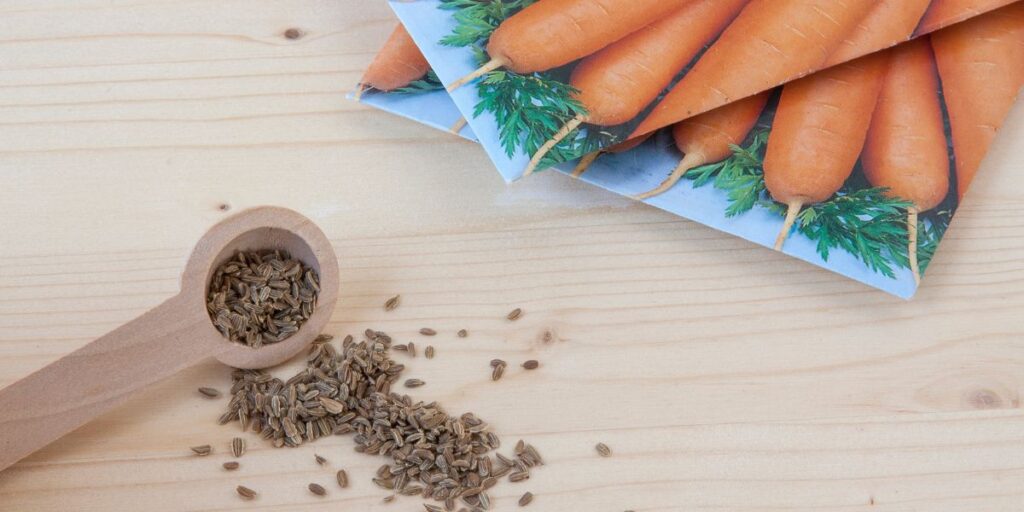
Selecting Seeds Based on Your Gardening Goals
Whether you’re a beginner looking for easy-to-grow varieties or an experienced gardener aiming for maximum yield, the right seed selection can make all the difference in your garden’s success.
For Beginners
If you’re just starting your gardening journey, it’s best to focus on crops that are easy to grow and quick to yield results. This approach helps you build confidence in your gardening abilities and keeps you motivated throughout the season. Some great options for beginners include:
- Lettuce and other leafy greens: These are fast-growing and can be harvested continuously.
- Radishes: They mature quickly, often in as little as four weeks.
- Beans: Both bush and pole varieties are relatively easy to grow and produce a bountiful harvest.
- Zucchini: Known for their prolific production, even a single plant can provide plenty of vegetables.
For Maximum Yield
If you’re looking to maximize your harvest, selecting high-yielding varieties is key. Many seed catalogs and online retailers offer information about a variety’s productivity, so you can make informed decisions. Some vegetables known for their high yields include:
- Tomatoes: Varieties like ‘Early Girl‘ and ‘Moneymaker‘ are known for their prolific production.
- Peppers: Look for hybrid varieties that are bred for increased yield.
- Pole beans: These typically produce more over a longer period than bush varieties.
- Brussels sprouts: Varieties like ‘Long Island‘ can yield 75-100 sprouts per plant.
Unique Vegetable Varieties
Looking to grow something out of the ordinary in your garden? There’s a world of unique vegetable varieties waiting for you to discover. Heirloom and open-pollinated seeds offer a diverse range of colors, flavors, and shapes that can add excitement to your garden and plate. Some interesting options to consider:
- Colorful tomatoes: Try varieties like ‘Chef’s Choice Orange’ for a vibrant twist on a classic vegetable.
- Unusual squash: Grow unique varieties such as ‘Long Island Cheese‘ pumpkin for something different.
- Heritage beans: Varieties like ‘French Horticultural Shell‘ offer both historical significance and culinary versatility.
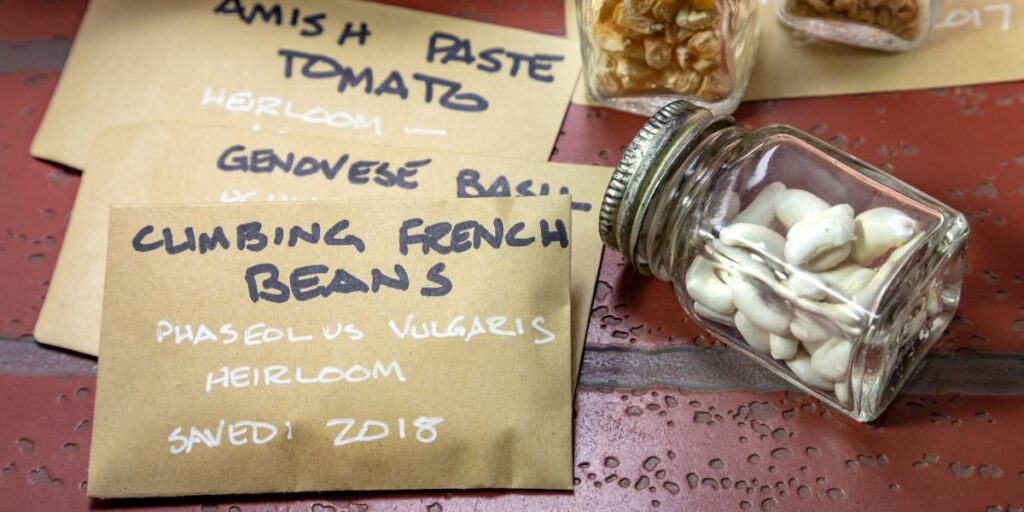
Where to Buy Quality Vegetable Seeds
Finding a reliable source for vegetable seeds is crucial for a successful garden. You have several options to explore, each with its own advantages. Let’s look at the best places to buy vegetable seeds and how to make the most of your seed selection process.
Local Sources
One of the most convenient ways to start your seed selection is by checking out local sources. You might begin by purchasing seeds from nearby stores. Big box stores and garden centers often carry a variety of regionally appropriate vegetable, fruit, and herb seeds. These options are great for beginners as they offer easy access to seeds that are likely to thrive in your area. The downside is that they likely won’t have a lot of variety or specialty seeds and tend to only carry the most popular types.
Don’t overlook the hidden gems in your community. Feed stores and farmer’s co-ops can be excellent sources for quality seeds. These local places often provide seeds that are well-suited to your region’s climate and growing conditions. Plus, you’ll benefit from the wealth of knowledge that the staff can share about gardening in your specific area.
Local nurseries are another fantastic option for seed shopping. They typically offer a curated selection of seeds that are suitable for your region. The added bonus is the personalized service and expert advice you can receive from knowledgeable staff members.
Online Seed Companies
Online seed companies offer an extensive selection of vegetable seeds. These companies usually provide detailed information about each variety, making it easier for you to choose the best seeds for your vegetable garden. Some of our favorite online seed retailers include:
- Fedco: An employee-owned seed company in Maine since 1978. Huge selections, incredible seed options.
- Territorial Seeds: Family owned company selling seeds in Oregon since 1979.
- Southern Exposure Seed Exchange: Based in Virginia with a focus on heirloom varieties; lots of really fun and unusual finds here.
- High Mowing: Over 700 varieties of organic and heirloom seeds; based in Vermont.
- Hudson Valley Seeds: A small seed company based in New York State with the most stunning seed packet artwork!
- Everwilde Farms: Family owned farm and company in Oregon selling organic, heirloom, and native seeds.
- Truelove Seeds: A collaborative seed company sourcing from 50 small-scale urban and rural farmers committed to in Pennsylvania.
- Kitazawa (now part of True Leaf Market): 100-year-old company specializing in Asian vegetable and flower seeds.
- Siskiyou Seeds: Organic seed company based in Oregon with a focus on regionally adapted heirloom and open-pollinated seeds.
- Native Seed Search: Specializing in indigenous seeds for the Southwest desert landscape.
- MIGardener: A reliable seed source based in Michigan with lots of heirloom options.
- Prairie Moon Nursery: An incredible company and resource offering native plants and seeds.
- JL Hudson Seeds: A public access seed bank with an astounding list of plants from around the world.
- Halifax Seed: Canadian company in business since 1866 specializing in seeds for northern gardeners.
- Free Heirloom Seeds: For the cost of postage, you can get a wide variety of heirloom seeds. Make sure to read the FAQs before ordering from here; there are limits to what you can order.
- Johnny’s Selected Seeds: Offers an extensive range of organic and hybrid seeds.
Here’s a tip for choosing an online seed company. Don’t get swayed by the pretty photos and clever web design of many seed companies. Go read the About Us page on the seed company’s website. If it is vague, doesn’t mention actual people or families or employees, or lacks authenticity, it’s probably some random people creating a website to sell seeds and make a buck. And, the seeds they sell probably aren’t great — these companies are ALL over the web. If there is an “about” story referencing actual places and actual people and farms, this is a real seed company. Good, reliable, dependable seed companies know that their story matters because we want to buy from people who know what they’re doing, growing their own seeds and not sourcing them all from unscrupulous entities or from other countries.
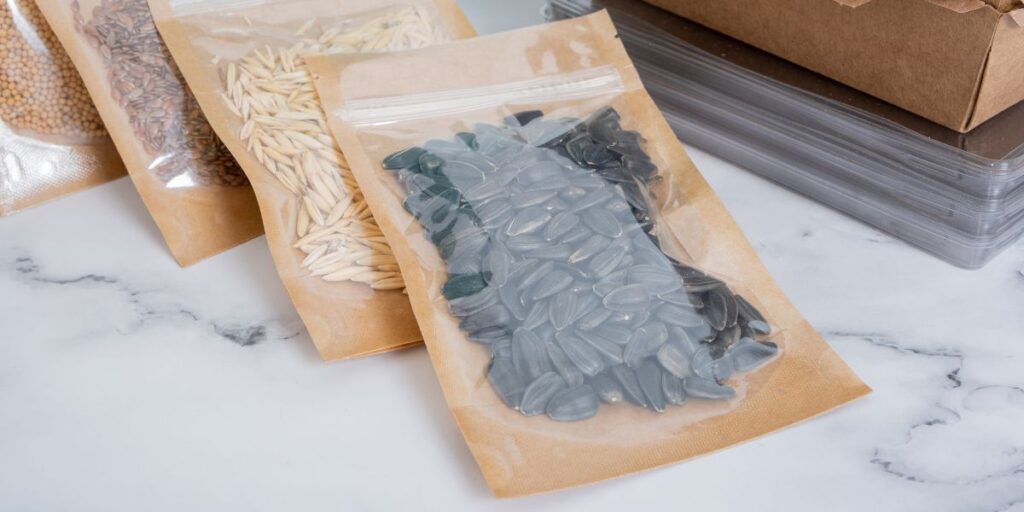
FAQs
What should I look for on a seed packet?
A good seed packet provides details on the proper planting depth and spacing for optimal growth. It should also indicate the expected number of days until germination and harvest. It will also have information about the plant’s sunlight and water requirements. Lastly, don’t forget to check the expiration date on the packet. Seeds typically remain viable for 2-3 years if stored properly. Using fresher seeds can increase your chances of successful germination and healthy plant growth.
How many seeds should I buy?
Calculate based on your garden size and succession planting plans. Most packets contain more than enough for a small garden. Consider sharing with fellow gardeners or storing extras properly for next season.
When is the best time to buy vegetable seeds?
Purchase seeds in late winter or early spring for the upcoming growing season. Some popular varieties may sell out quickly, so ordering early ensures the best selection.
How should I store unused seeds?
Keep seeds in an airtight container in a cool, dry place. Add a silica gel packet to absorb moisture. Properly stored, most vegetable seeds remain viable for 2-3 years.

